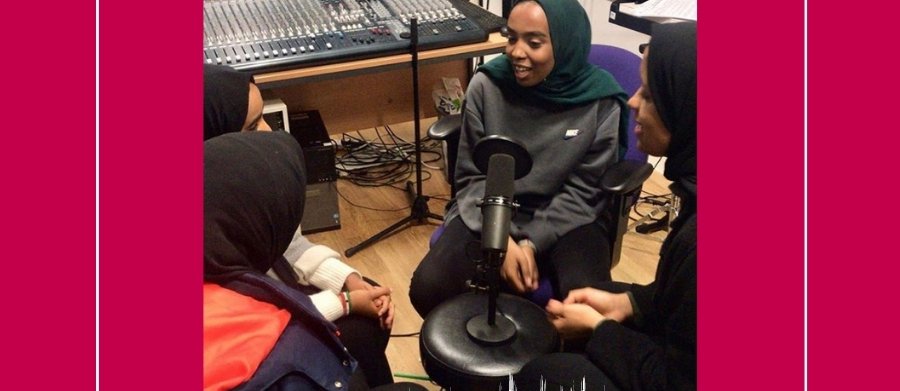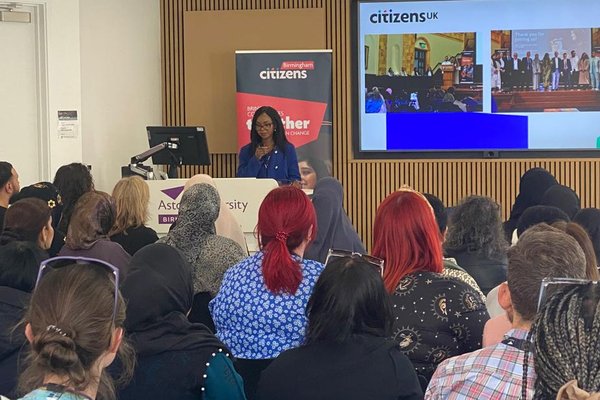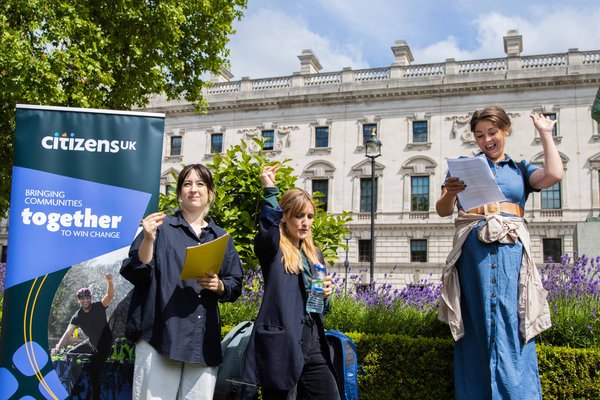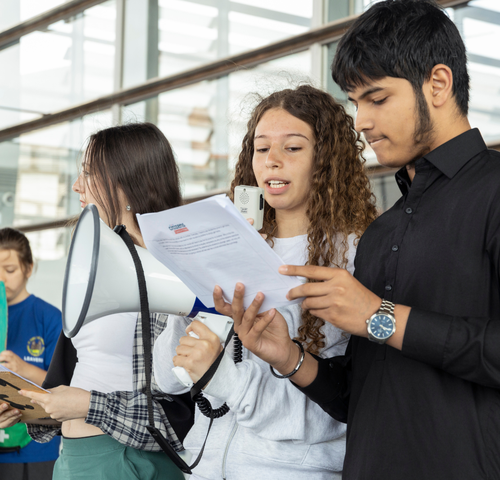How this podcast is helping the Somali community talk about mental health
For many of us, opening up about mental health struggles is a tough, but necessary, conversation.
And Cymru Citizens UK leaders Hakima, Hamdah and Laila are helping their local Somali community do just that. They are the creators and hosts of the Somali Mindfulness Podcast, a safe space where they discuss a range of issues relating to mental health.
We spoke to Hakima about the inspirations to create the podcast, how older generations are dealing with their own trauma, and her number one tip for anyone struggling with their mental health right now.

How did you first get involved with Citizens UK?
I first found out about Citizens UK through Ali Abdi [Community Organiser in Cymru Wales]. I needed help with my podcast, Somali Mindfulness, and asked for Ali’s help.
While he was supporting me, he told me about his work in Wales, and with Citizens UK, and suggested that I join and start carrying out mental health actions.
And during that time what have you learnt? What have been the benefits of being a Citizens UK leader?
I’ve learned that there are so many people who are passionate about the same issues I am.
Before I never really knew a lot of people who had similar opinions and thoughts to me; who also wanted to take action and help others. But now I have people, who are friends, that I can reach out to about campaigns I’m excited about. Seeing other passionate people in Zoom calls (and hopefully in person soon!) has been really reassuring to me to know I’m not alone.
What inspired you to set up the Somali Mindfulness Podcast?
It all started a few years ago. Me and a whole group of my friends really wanted to do something that would help our community, but we didn’t know exactly what. That’s when we realised there are a lot of issues in the Somali community when it comes to speaking about mental health.
So we came up with the Somali Mindfulness Podcast and started planning events around it. The topics we’d discuss in the podcast, for example, we’d then run an event on - like an open mic night, where people would read their own poetry on issues about identity.
Seeing people say to us: “you guys really helped, it has made us see things in a different light.” That was really big for us - it really made us believe what we’re doing is worthwhile; that it matters.
What was it that made you think the best way to help your community was through a podcast?
I'm a huge podcast fan - and I love listening to them. They make you think in a different way. When people talk about certain topics, and you’re listening, it’s almost as if you’re inputting or taking advice without even realising. It’s a conversation.
I thought it would be a good way to get our message out there, and easy for people to listen to and share. So even if there are people that can’t come to our events, they’d still be able to hear the topics discussed and be part of it.
What kind of responses have you had from the podcast from people in Butetown?
It’s been amazing, honestly. At first, I didn’t think it would be big - or as many people would know about it and interact with it. People in the Somali community are very quiet, so I didn’t think I would read as many responses as I have.
Seeing people say to us: “you guys really helped, it has made us see things in a different light.” That was really big for us - it really made us believe what we’re doing is worthwhile; that it matters.
What is next for the podcast? What do you hope for?
Now we are trying to connect with younger and older people. It’s more difficult to connect with parents and grandparents from our community than it is with people our own age. But we’re trying to create events which will benefit them.
That must be harder, since most of what you’re doing is online.
Yeah, it’s definitely difficult. I believe change happens in the household. And mental health is one of those topics not really discussed or acknowledged at home. Older generations haven’t been taught about it in the way that my generation has.
So what we're trying to do is sort of change the older generation, because we know that they are people who are going to affect the younger people most in households.
Not speaking about mental health is now affecting younger people who may be going through depression or anxiety. And that’s where change needs to happen, otherwise history will repeat itself.
Why do you think the older generation are less open to speaking about their mental health?
I really think it’s because of the way they were brought up. And I know the older generation have been through a lot - they had to travel far away from their homes because of war [in Somalia], and change their whole way of life.
They believed that there wasn’t time to get upset or to think about what they’re going through - they just had to save their families lives.
So for them to focus on mental health, they didn't have time for that, they just had to survive. Which is totally understandable, they’ll be going through their own personal traumas even now.
But not speaking about mental health is now affecting younger people who may be going through depression or anxiety. And that’s where change needs to happen, otherwise history will repeat itself.
And finally, what is your number one tip for people struggling with their mental health? What gets you through those difficult days?
I truly believe that if you’re going through a difficult time, there is a bigger meaning to it.
I wouldn't have thought about creating the Somali Mindfulness Podcast if it wasn't for my struggles with anxiety. Even though I hated the fact I had anxiety and I suffered a lot from it, I'm thankful it happened because I ended up benefiting not only myself, but other people suffering too. I wouldn’t be where I am right now.
Keep updated with the Somali Mindfulness podcast on:
Citizens UK is prioritising mental health as one of our top issues during lockdown. We're organising training for mental health champions in our membership to help your communities build capacity to deal with the crisis unleashed by Covid-19.
Get in touch with Pete Brierley at pete.brierley@citizensuk.org for more information.
Featured Content
-
 Reflections on Women in Community Leadership Organising for Change
Reflections on Women in Community Leadership Organising for ChangeReflections from the co-chairs of Birmingham Citizens on the role women
Read more -

-
 Citizens UK celebrates the success of the Making London a Living Wage City project
Citizens UK celebrates the success of the Making London a Living Wage City projectThe project, which ran from September 2021 to August 2025, is a success story which brought together civil society, businesses and Government to tackle in-work poverty across London.
Read more





